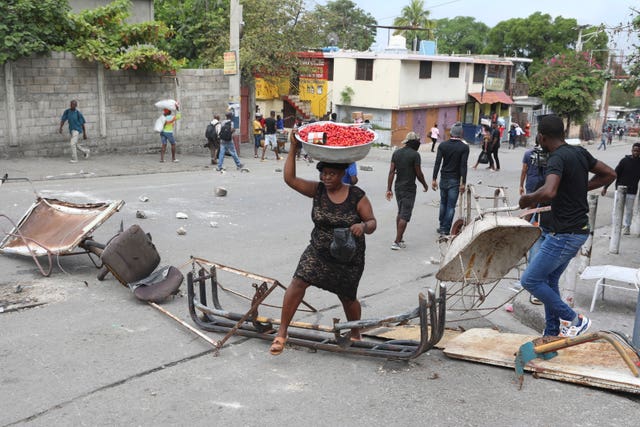Haiti could face ‘chaos’ without more international support, UN envoy warns
Gangs have grown in power since the 2021 assassination of president Jovenel Moise.

The top UN official in Haiti sounded an alarm to the organisation’s Security Council that escalating gang violence is liable to lead the Caribbean nation to “a point of no return”.
Maria Isabel Salvador warned on Monday that “Haiti could face total chaos” without increased funding and support for the operation of the Kenya-led multinational force helping Haiti’s police to tackle the gangs’ expanding violence into areas beyond the capital, Port-Au-Prince.
Most recently, she said, gangs seized the city of Mirebalais in central Haiti, and during the attack, over 500 prisoners were freed.

It was the fifth prison break in under a year, “part of a deliberate effort to entrench dominance, dismantle institutions and instil fear”.
Haiti’s police, supported by the armed forces and the Kenya-led force, were overwhelmed by the scale and duration of the violence, the UN special representative said..
The gangs have grown in power since the July 7 2021, assassination of president Jovenel Moise and are now estimated to control 85% of the capital and are moving into surrounding areas.
Haiti has not had a president since then.
The UN-backed mission led by Kenyan police arrived in Haiti last year to help local authorities quell gang violence.
The mission remains understaffed and underfunded, with only about 40% of the 2,500 personnel originally envisioned.
Ms Salvador said that in February and March alone, 1,086 people were killed and 383 were injured.
In addition, according to the UN migration office, over 60,000 Haitians were displaced in the past two months, adding to 1 million already displaced by December.
“These figures are expected to rise,” she said.
Earlier this month, the leader of Haiti’s transitional presidential council, Fritz Alphonse Jean, tried to allay surging alarm among Haitians over the rampant gang violence by acknowledging that the country has “become hell for everyone.”
He promised new measures to stop the bloodshed.
But Ms Salvador, who heads the UN political mission in the country, said the Haitian government’s efforts alone will be insufficient to significantly reduce the intensity of the violence perpetrated by criminal groups.
In February, UN Secretary-General Antonio Guterres said he would ask the Security Council to authorise funding for the structural and logistical expenses of the Kenya-led mission from the UN budget.

But there are no signs that the 15-member council plans to address this request anytime soon.
“Without timely, decisive and concrete international assistance, the security situation in Haiti may not change,” Ms Salvador warned.
“Haiti could face total chaos.”
Kenya’s national security adviser, Monica Juma, told the council in a video briefing from Nairobi that the force has entered “a decisive phase of its operation” where gangs are coordinating operations and attacking people and strategic installations, and targeting the political establishment.
While the Haitian police and the multinational force have launched intensive anti-gang operations and achieved some notable progress, especially in securing critical infrastructure, she said a significant gap exists.
Ms Juma said 261 Kenyan police officers are trained and ready to deploy to Haiti, but they can’t get there because of a lack of equipment and logistical support.
She urged the council to take a “more assertive and proactive role” in helping to stabilise Haiti, saying time is of the essence.
Ms Juma said that it is critical to stabilising the country is stopping the flow of guns and ammunition to the gangs and implementing sanctions against gang leaders.
UN experts say most arms come from the United States, specifically the Miami area.





